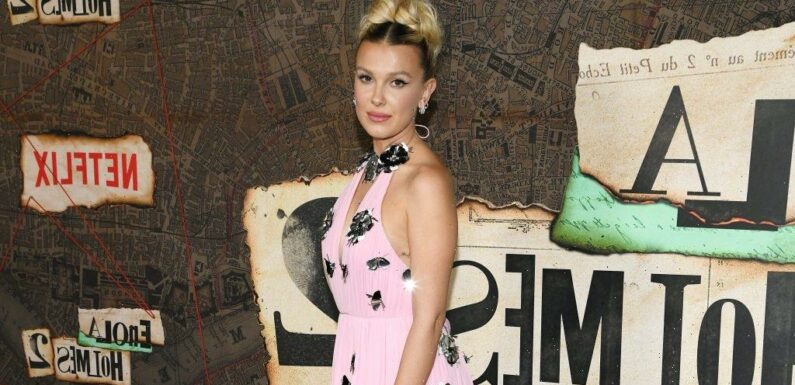
Millie Bobby Brown’s eccentric fourth wall breaks have become such a distinguishable trademark of Harry Bradbeer’s “Enola Holmes” films that in the sequel, the “Stranger Things” star tried to do it in every scene she could.
“Maybe Harry can agree with me on this but I think in every scene we tried doing, we tried breaking the fourth wall and then he edited the ones that landed the most,” Brown told Variety at the New York premiere of “Enola Holmes 2” on Thursday night at the Paris Theater.
Brown went on to say that she took inspiration from Phoebe Waller-Bridge’s fourth wall-breaking techniques in “Fleabag,” the critically acclaimed Amazon Prime series on which Bradbeer also served as a director.
“It’s just like the most perfect way to break the fourth wall with her wit, her humor, her timing,” Bobby Brown said. “It’s so inspirational to me. I know that Harry has worked so closely with Phoebe in the past, so it’s been a blessing to have him guide me on such a great course of how to achieve it.”
The sequel sees Enola Holmes continuing to follow in the footsteps of her famous brother, Sherlock (Henry Cavill), and opening her own detective-for-hire agency. On the red carpet, Cavill said “it’s incredibly exciting” to return to the titular role of Superman but that he enjoys playing a version of Sherlock Holmes that is a supporting character.
“This is a Sherlock that exists in a universe which none of the other Sherlocks have — a universe where Enola exists,” Cavill told Variety. “It allows for a different shade to Sherlock because he’s a supporting character. It’s no longer about him, it’s about Enola and it’s about her story.”
While the first film followed Enola meddling with aristocratic affairs, Bradbeer said he wanted to flip the script for the sequel by having the young detective uncover systemic issues at a matchstick factory.
His storyline is based on the Matchgirls’ Strike of 1888, a real-life event where teenage girls protested poor working conditions. Matches used to be made by dipping poplar sticks into white phosphorus, which caused some factory workers to develop extreme facial disfigurations known as “phossy jaw.”
“The Matchgirls’ Strike struck us as being a perfect feminist symbol — it was the first strike for women, by women,” Bradbeer told Variety. “That reflected our idea that Enola, to advance, has to work with others and not just be reliant on herself. It’s a story that goes from ‘I’ to ‘we,’ and that is a story of sisterhood.”
Bradbeer said he hopes his film shines a light on the historical event and teaches viewers about “the power of the group.” Susan Wokoma, who plays a secret feminist society member in the film, said she believes young girls can learn a lot from the Matchgirls’ Strike.
“Learning how to petition for yourself, learning how to speak up, knowing what your rights are, knowing that you’re not too young to be able to make change — that’s what these girls did,” Wokoma said.
When asked about future sequels, star Sharon Duncan-Brewster emphasized that there are plenty of underrepresented British figures from the late 1800s that could be worked into Enola’s detective stories.
“There are many people who were in the U.K. at the time that nobody knows about at all,” Duncan-Brewster said. “There were Black scientists, doctors, princes, scholars — footballers who became soldiers and ended up coming back and getting medals. Any one of them we can talk about.”
Bradbeer suggested that the next “Enola Holmes” film could highlight a defining moment of the women’s suffrage movement.
“The suffrage movement comes to a climax around the time of the first World War, so there’s that to look forward to,” the director said.
Read More About:
Source: Read Full Article